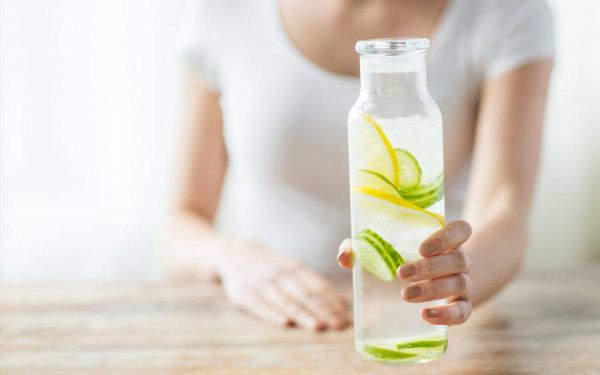6 Simple Ways to Stay Hydrated
How to prevent dehydration in San Diego’s warm, dry climate

How to prevent dehydration in San Diego’s warm, dry climate
San Diego’s sunny and warm weather makes it perfect for outdoor activities for people of all ages. However, the region is no stranger to heatwaves or very hot weather, so it’s important to drink plenty of water to prevent dehydration.
Since our bodies are primarily composed of water, maintaining proper hydration is vital, especially during exercise or physical activity in the sun. Dehydration can occur when the body loses too much fluid through sweat. Those at higher risk include athletes, individuals working in hot conditions, older adults, children and people with chronic illnesses.
“Fluids are essential to keeping the vital organs active,” says Stacie Ly, MD, an internal medicine physician at Scripps Coastal Medical Center Carlsbad. “Dehydration can be mild, moderate or severe, based on how much of your body’s fluid is lost or not replaced. Severe cases can lead to a hospital trip for IV fluids and could sometimes result in kidney damage or nervous system problems.”
How much water should you drink a day?
According to Dr. Ly, there’s something to the old “eight glasses a day” adage. For adults, that would be a half-gallon — 64 ounces, or eight (8-ounce) glasses. It’s a good start but not a hard rule. You may need more if you’re exercising or the weather is especially hot.
The amount of water you need to drink daily depends on several factors, such as age, gender, size, activity level and weather. Pregnancy, breastfeeding and health also impact your water intake.
The best advice is to drink water when you’re thirsty and stay hydrated throughout the day to prevention dehydration, according to Dr. Ly.
And if you’re working out intensely or dehydration symptoms like headache or lightheadedness have already set in, electrolytes are key.
“Water is nice, but when you’re dehydrated you also need electrolytes,” Dr. Ly says. Skip the diet drinks, though. Sugar helps the electrolytes absorb.
Six tips for staying hydrated
The best defense against dehydration is prevention. Follow these six tips to stay safe and healthy, especially when temperatures — or your activity levels — increase:
1. Don’t wait till you’re thirsty to drink
By the time you feel thirsty, you’re already slightly dehydrated. Sip water steadily throughout the day and drink more fluids than usual when the weather is hot, especially if you’re active.
If you need a reminder to stay hydrated, carry a reusable water bottle with you and set a timer on your phone to notify you to drink water throughout the day.
2. Flavor your water
If plain water tastes boring to you, you can add flavor with fresh fruits or a splash of fruit juice. You can also consume clear broths, ice pops or sports drinks (especially if you’re doing intense exercise). Just make sure to limit caffeine and alcohol.
3. Eat water-rich fruits and vegetables.
Certain fruits and vegetables are high in water content and nutrients. Watermelon, strawberries, cantaloupe, peaches and pineapples are fruits with high-water content. Water-rich vegetables include cucumbers, leafy greens, radishes, celery, zucchini and tomatoes.
4. Stay inside when it gets too hot
Avoid sun exposure, especially between 10 am and 2 pm, when the rays are strongest. Instead, plan outdoor activities in the early morning or evening.
Consider exercising indoors with air conditioning instead of exercising outside in scorching hot weather. If you usually hike or run outside, try swimming instead.
Stay indoors to avoid the heat, even if you’re not working out. If you don’t have air conditioning at home, try a shopping center, movie theater or public library.
5. Dress for the weather
Wear light, loose-fitting clothing that lets your skin breathe. Dark colors absorb heat, so stick with lighter shades. Wear a wide-brimmed hat in the sun to keep your head cool and use plenty of sunscreen to avoid sunburn, which can increase your skin temperature and make it harder to stay cool.
6. Be aware of the signs of dehydration
Dehydration is common and can affect anyone, but some people are more at risk, especially children and older adults.
Children are at higher risk of dehydration because they have a higher percentage of water in their bodies, which decreases with age. Children also may not always realize they are thirsty and may forget to drink enough water.
Older adults are at higher risk of dehydration due to age-related health problems and decreased thirst sensation.
“Older people may forget to drink water or not recognize their thirst,” says Dr. Ly. “They might also neglect to prevent dehydration the same way a younger person would. Be cognizant about that if you have a parent or older person around.”
Keep an eye out for any of these signs of dehydration:
Darker-than-usual urine Not urinating despite steadily drinking water Muscle cramps Bad breath Fatigue Fever or chills Craving sweets Dry mouth/skin Fast heartbeat Irritability Confusion DrowsinessAnyone with a fever, vomiting or diarrhea should drink plenty of fluids. Do not wait for signs of dehydration to appear.
相关知识
Hydration: How to Stay Hydrated in 6 Steps
20 Simple Ways to Improve Your Health
20 Tips for Staying Hydrated Throughout the Day
Let the Good Times Flow! The Importance of Staying Hydrated
How to Stay Fit All Winter Without an Expensive Gym Membership
The Role of Hydration in Maintaining Health
Proper Hydration Linked to Healthier Weight
How to Hydrate Yourself (Hint: It’s Not Water)
Staying Hydrated, Staying Healthy
The 14 Most Hydrating Foods & Drinks (That Aren't Plain Water)
网址: 6 Simple Ways to Stay Hydrated https://m.trfsz.com/newsview1123513.html